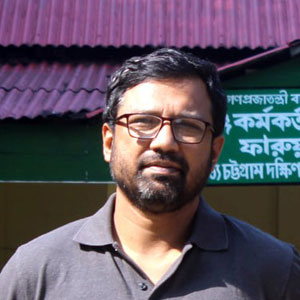Responsive Mobile Menu
Shahjalal University of Science and Technology
Faculty Profile

Dr. Swapan Kumar Sarker
Professor
Contact Information
- Office Address: Professor Institute of Shahjalal University of Science and Technology, Sylhet-3114, Bangladesh
- Phone: +8801791069892
- Email: swapan-fes@sust.edu, swapan_sust@yahoo.com
Education
- PhD in Environmental & Evolutionary Biology, University of Glasgow, UK [Topic: Spatial & temporal patterns of mangrove abundance, diversity & functions in the Sundarbans]
- Master of Environment and Sustainability, Monash University, Melbourne, Australia
- B.Sc. Honors in Forestry, Shahjalal University of Science and Technology, Bangladesh
Research Interests
- Ecological Modeling, Mangrove Ecology, Trait-based Ecology, Conservation Biology, Spatial Ecology, Functional Biogeography, Natural Resource Management
Active Research Project
- 2021 – 2023: Developing Habitat-based Forest Tree Species Distribution and Diversity Models to Support Sylhet Hill Forests Conservation. Funded by: World Bank.
- 2022 – 2026: Sustaining Sundarbans Mangrove Ecosystem Services, Funded by: Australian Centre for International Agricultural Research (ACIAR)
- 2019 – 2023: Soundscape Ecology in the Sundarbans Mangrove Ecosystem, A joint research project with Purdue University, USA, funded by NASA
Previous Research Project
- 2018 – 2020: Integrating Ecological Models and Conservation Planning Frameworks for Sustainable Protected Area Management in Bangladesh. Funded by: SUST Research Centre.
- 2018 – 2019: Sundarbans fisheries: a model system for the application of landscape ecology and social science approaches to management, Funded by: NERC (Natural Environment Research Council), UK.
- 2017 – 2018: Forecasting mangrove distributions in the Sundarbans under climate change: Implications for conservation. Funded by: SUST Research Centre.
- 2013-2017: Spatial Analysis of Biodiversity in the Sundarbans World Heritage Ecosystem. Reference: BDCA 2013-6, Funded by: DFID, UK.
- 2010-2012: Developing allometric models for estimating above ground biomass of wetland tree species in the north-eastern Bangladesh. Funded by: SUST Research Centre.
Journal Publish
- 1. Chowdhury, M.Q., Sarker, S.K., Sultana, R, Datta, A, Saimun, M.S.R., & Rashid, M.A.ZM., 2023. Synergistic effects of climate and salinity on radial growth of Excoecaria agallocha L. in the Sundarbans world heritage mangrove ecosystem. Estuarine, Coastal and Shelf Science. [Impact factor: 3.23, Publisher: Elsevier]
- 2. Sacred places and spiritual beliefs can enhance biodiversity conservation: A case study from the north-eastern Bangladesh
- 3. Ahmed, S, Sarker, S.K., et al. 2022. Salinity reduces site quality and mangrove forest functions. From monitoring to understanding. Science of The Total Environment. 853. [Impact factor: 10.75, Publisher: Elsevier]
- 4. Sarker, S.K, Richard Reeve, and Jason Matthiopoulos. 2021. Solving the Fourth‐corner Problem: Forecasting Ecosystem Primary Production from Spatial Multispecies Trait‐based Models. Ecological Monographs 91(3): ecm.1454. [Impact factor: 9.81, Publisher: Ecological Society of America & Wiley]
- 5. Muscarella, Robert, Thaise Emilio,..... Ferry Slik,,....Sarker, S.K…. et al. 2020. “The Global Abundance of Tree Palms.” Edited by Melodie McGeoch. Global Ecology and Biogeography 29 (9): 1495–1514. [Impact factor: 6.91, Publisher: Wiley]
- 6. Sharmin, M., and S. K. Sarker. 2020. Are Diamond’s assembly rules applicable to tropical threatened vascular plants assemblages in the Tarap Hill Reserve in Bangladesh? SUST Journal of Science & Technology (SUSTJST) 30:49–58.
- 7. Are Diamond's assembly rules applicable to tropical threatened vascular plants assemblages in the Tarap Hill Reserve in Bangladesh?
- 8. Sarker S. K., Matthiopoulos J, ………. Reeve R. 2019, 1980s–2010s: The world's largest mangrove ecosystem is becoming homogeneous. Biological Conservation. 236, 79-91, [Impact factor: 7.5, Publisher: Elsevier]
- 9. Sarker S. K., Reeve R, Paul NK, Matthiopoulos J. 2019, Modelling spatial biodiversity in the world’s largest mangrove ecosystem—The Bangladesh Sundarbans: A baseline for conservation. Diversity & Distributions. 00:1–14. [Impact factor: 5.14, Publisher: Wiley]
- 10. Slik, J.W.F. ……Sarker, S. K……et al., 2018. Phylogenetic classification of the world’s tropical forests. Proceedings of the National Academy of Sciences (PNAS), USA [Impact factor: 12.78, Publisher: United States National Academy of Sciences]
- 11. Sarker, S. K., Reeve, R., Thompson, J, Paul, N.K., & Matthiopoulos, J., 2016. Are we failing to protect threatened mangroves in the Sundarbans world heritage ecosystem? Scientific Reports, 6, 21234; [Impact factor: 5.0, Publisher: Nature Publishing Group]
- 12. Slik, J.W.F. ……Sarker, S.K……et al., 2015. An estimate of the number of tropical tree species. Proceedings of the National Academy of Sciences (PNAS), USA 112(24), pp.7472–7477. [Impact factor: 12.78, Publisher: United States National Academy of Sciences]
- 13. Sarker, S.K. et al., 2015. Tree assemblages and diversity patterns in Tropical Juri Forest, Bangladesh. Journal of Forestry Research, 26(1), pp.159–169. [Impact factor: 2.15, Publisher: Springer]
- 14. Rahman, H.M.T., Hickey, G.M. & Sarker, S.K., 2015. Examining the role of social capital in community collective action for sustainable wetland fisheries in Bangladesh. Wetlands, 35, pp.487–499. [Impact factor: 2.07, Publisher: Springer]
- 15. Rahman, H.M.T., Sarker, S.K., Hickey, G.M., Haque, M.M., Das, N., 2014. Informal Institutional Responses to Government Interventions: Lessons from Madhupur National Park, Bangladesh. Environmental Management, 54(5), pp.1175–1189. [Impact factor: 3.64, Publisher: Springer]
- 16. Sarker, S.K. et al., 2014. Environmental correlates of vegetation distribution in tropical Juri forest, Bangladesh. Tropical Ecology, 55(2), pp.177–193. [Impact factor: 1.57, Publisher: International Society for Tropical Ecology]
- 17. Sarker, S. K. et al., 2013. Disentangling the role of soil in structuring tropical tree communities at Tarap Hill Reserve of Bangladesh. Ecological Research, 28(4), pp.553–565. [Impact factor: 2.05, Publisher: Wiley]
- 18. Chowdhury, M.Q., Sarker, S. K., Deb, J.C. & Sonet, S.S., 2013. Timber species grouping in Bangladesh: linking wood properties. Wood Science and Technology, 47(4), pp.797–813. [Impact factor: 2.89, Publisher: Springer]
- 19. Sarker, S. K., Das, N., Chowdhury, M. Q., Haque, M.M., 2013. Developing allometric equations for estimating leaf area and leaf biomass of Artocarpus chaplasha in Raghunandan Hill Reserve, Bangladesh. Southern Forests: A Journal of Forest Science, 75(1), pp.51–57. [Impact factor: 0.89, Publisher: Taylor & Francis]
- 20. Rahman, H.M.T., Hickey, G.M. & Sarker, S.K., 2012. A framework for evaluating collective action and informal institutional dynamics under a resource management policy of decentralization. Ecological Economics, 83(October 2015), pp.32–41. [Impact factor: 6.54, Publisher: Elsevier]
- 21. Sarker, S.K., Deb, J.C. & Halim, M. a., 2011. A diagnosis of existing logging bans in Bangladesh. International Forestry Review, 13(4), pp.461–475. [Impact factor: 1.84, Publisher: Commonwealth forestry Association]
- 22. Alam, M. & Sarker, S.K., 2011. Homestead Agroforestry in Bangladesh: Dynamics of Stand Structure and Biodiversity. Journal of Sustainable Forestry, 30(6), pp.584–599. [Impact factor: 1.5, Publisher: Taylor & Francis]
- 23. M. Abdul Halim, M. S. H. Chowdhury, A. I. Wadud, M. S. Uddin, Sarker, S. K. and M. B. Uddin, 2007, The use of plants in traditional health care practice of the shaiji community in Southwestern Bangladesh, Journal of Tropical Forest Science, Vol. 19, No. 3 (July 2007), pp. 168-175. [Impact factor: 1.04, Publisher: Forest Research Institute Malaysia]
- 24. Alam, M. … Sarker, S. K. et al., 2008. Sustainability of Sal (Shorea robusta) forest in Bangladesh: past, present and future actions. International Forestry Review, 10(1), pp.29–37. [Impact factor: 1.84, Publisher: Commonwealth forestry Association]
External Affiliations
- Journal Referee: Ecological Applications, Ecological Indicators, Biotropica, Tropical Ecology, Natural Resources Forum, International Forestry Review, Regional Studies in Marine Science, ICES Journal of Marine Science (Oxford University Press), Forests, Sustainability, Sci
Awards & Recognition
- Commonwealth Doctoral Scholarship funded by Commonwealth Scholarship Commission, United Kingdom (2013 - 2017)
- Prime Minister (Bangladesh) Gold Medal Award (2006)
- Chancellors (President) Award (2006)
- Vice Chancellors Award (2006)
Teaching
- BSc. level: Forest Management, Biodiversity Conservation, Mangrove Forestry, Forest Ecology, Research Methodology
- MSc level: Forest Resource Management, Sustainable Development
Graduate Supervision
- BSc Research Project students supervised: 50
- MSc Research Project students supervised: 20
- MSc Thesis students supervised: 35
